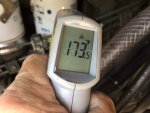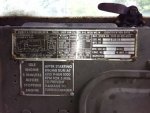- 333
- 262
- 63
- Location
- Denver, Colorado
How many Multifuels have been ruined because of...
I've read posts on SS from folks making generalized statements like "the Multifuel is a weak design" or "they'll ventilate the block without warning" but I don't recall reading anything stating definitively whythe engine is to blame... i.e. bad metallurgy, poor castings, inferior engineering of specific components, etc. I've heard reasons like; lack of driver training, lack of maintenance, and just sheer abuse/over-revving. But I wonder if something else is at least partially to blame for the perception that Multifuels fail prematurely...
It was 91 degrees here today, and I cruised all over town with my radiator 1/2 blocked, and my temp never got above 180. Every time I drive my truck I go to great lengths to make sure it gets up to operating temp as quick as I can by completely blocking the radiator until 180 is reached, and managing how much is blocked thereafter (I've tested my thermostat, it opens right about 175) . And I make sure the temp stays at 180-200 for an extended time. As cold as our trucks tend to run, it makes me wonder if this doesn't have something to do with many Multifuel engines going bad prematurely from folks running them mile after mile, year after year, with the op temp rarely getting warm enough to prevent;
- The cylinders from getting glazed/scored because they didn't get warm enough for the rings to seal well, and got washed down with fuel.
-Oil from getting contaminated/acidic because it rarely got hot enough to burn off accumulated moisture.
-Bearings and shafts from getting briefly but repeatedly hammered under load when cold, while lubed with afformentioned contaminated oil.
I've also read things like; "Drive it like you stole it", "Run it up to redline for every shift", "Put a couple tons in the bed and run the piss out of it every once in awhile"...
If we make sure the engine is regularly ran at op temp, and isn't subjected to lugging or long periods of idling, do we really need to put our trucks through that kind of load to keep them happy? or can they live long lives at 180 degrees and cruising between 1500-2200 rpm?
I'd like to start a discussion here on this topic, and hear the thoughts of our resident Deuce Gurus on the subject. Thanks in advance for your replies. - MN
I've read posts on SS from folks making generalized statements like "the Multifuel is a weak design" or "they'll ventilate the block without warning" but I don't recall reading anything stating definitively whythe engine is to blame... i.e. bad metallurgy, poor castings, inferior engineering of specific components, etc. I've heard reasons like; lack of driver training, lack of maintenance, and just sheer abuse/over-revving. But I wonder if something else is at least partially to blame for the perception that Multifuels fail prematurely...
It was 91 degrees here today, and I cruised all over town with my radiator 1/2 blocked, and my temp never got above 180. Every time I drive my truck I go to great lengths to make sure it gets up to operating temp as quick as I can by completely blocking the radiator until 180 is reached, and managing how much is blocked thereafter (I've tested my thermostat, it opens right about 175) . And I make sure the temp stays at 180-200 for an extended time. As cold as our trucks tend to run, it makes me wonder if this doesn't have something to do with many Multifuel engines going bad prematurely from folks running them mile after mile, year after year, with the op temp rarely getting warm enough to prevent;
- The cylinders from getting glazed/scored because they didn't get warm enough for the rings to seal well, and got washed down with fuel.
-Oil from getting contaminated/acidic because it rarely got hot enough to burn off accumulated moisture.
-Bearings and shafts from getting briefly but repeatedly hammered under load when cold, while lubed with afformentioned contaminated oil.
I've also read things like; "Drive it like you stole it", "Run it up to redline for every shift", "Put a couple tons in the bed and run the piss out of it every once in awhile"...
If we make sure the engine is regularly ran at op temp, and isn't subjected to lugging or long periods of idling, do we really need to put our trucks through that kind of load to keep them happy? or can they live long lives at 180 degrees and cruising between 1500-2200 rpm?
I'd like to start a discussion here on this topic, and hear the thoughts of our resident Deuce Gurus on the subject. Thanks in advance for your replies. - MN
Last edited:




